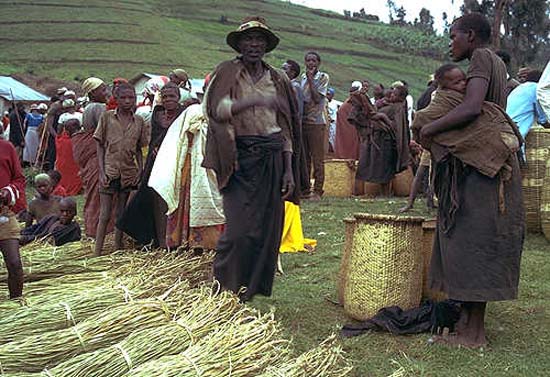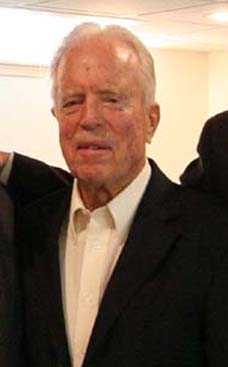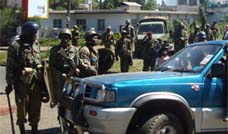
President Bush, on the third country stop of his five-nation Africa tour February 19, announced a $100 million peacekeeper training initiative for Darfur, signed a bilateral investment treaty with Rwanda and told Rwandans that the Peace Corps will be returning to their country for the first time since 1993. Besides hailing the return of the Peace Corps, which he called "good, decent folks coming into your country to help," he cited the success of his President's Malaria Initiative (PMI) in Rwanda, which has set a goal of spraying more than 350,000 homes and providing more than 900,000 treatments of lifesaving medicine.
Peace Corps returning to Rwanda
Rwanda: Bush Announces Multiple Initiatives
America.gov (Washington, DC)
19 February 2008
Posted to the web 19 February 2008
President Bush, on the third country stop of his five-nation Africa tour February 19, announced a $100 million peacekeeper training initiative for Darfur, signed a bilateral investment treaty with Rwanda and told Rwandans that the Peace Corps will be returning to their country for the first time since 1993.
Bush made the announcements at a joint press availability with Rwandan President Paul Kagame following extensive talks with Kagame and his Cabinet. Discussions included issues pertinent to Rwanda and to the region, such as bringing about peace in the Darfur region of Sudan and in the Eastern Congo.
Providing details on the peacekeeping training initiative, Bush said, "We are cooperating to address violence and genocide in Darfur." Bush said he was "not surprised that the first nation to step up and say we want to deploy peacekeepers" to Darfur was Rwanda. Bush thanked the Rwandan president, saying "it is a strong statement on your part," and he credited Rwanda for being one of the largest contributors to peace and stability in Darfur.
The United States, Bush said, has helped to train more than 7,000 Rwandan peacekeepers and provided more than $17 million to equip and transport these forces to Darfur.
Both he and Kagame, Bush said, agree that "the role of the United States is to help Africans deal with African problems." One such problem is the genocide in Darfur.
Bush said that of the $100 million to fund the United Nations Mission in Darfur (UNIMID) peacekeepers, about $12 million will go to Rwanda to train additional peacekeepers and purchase needed vehicles for them. Funds also will be distributed to Ethiopia, Ghana, Senegal, Tanzania, Burkina Faso and Malawi, he said.
Bush called on other nations to join and "help get this problem solved" and pledged the United States will help. "We will help through sanctions. We will help through pressure and we will help provide money to get these forces in -- in an effective manner," he said.
Bush said that, in addition to discussions about conflict areas, his talks with Kagame also involved economic issues, including the bilateral investment treaty he and Kagame signed.
That agreement, Bush said, "sends a signal to U.S. companies that they ought to consider investing in Rwanda" because private investment is far more effective in fueling long-term economic growth and development than government grants. The treaty will provide legal safeguards to U.S. corporations investing in Rwanda, he said, promoting transparency and legal protections for all.
MALARIA, HIV/AIDS INITIATIVES TOUTED
Besides hailing the return of the Peace Corps, which he called "good, decent folks coming into your country to help," he cited the success of his President's Malaria Initiative (PMI) in Rwanda, which has set a goal of spraying more than 350,000 homes and providing more than 900,000 treatments of lifesaving medicine.
On HIV/AIDS, Bush said his President's Emergency Plan for AIDS Relief (PEPFAR) has helped deliver anti-retroviral drugs to 44,000 Rwandans and 650,000 pregnant women in Africa to help prevent viral transmission from mother to child. "This is a good beginning," he said, and then asked the U.S. Congress to double funding for PEPFAR from $15 billion over five years to $30 billion.
In his comments, Kagame praised Bush for his dedication to Africa. He said the signing of the bilateral investment treaty is a direct reflection of the values that the United States and Rwanda share: investment in people; the promotion of democracy; and an accessible, transparent government serving the people.
Kagame said Rwanda is now a vastly different nation than it was at the time of the 1994 genocide, which claimed the lives of more than 800,000 people. Rwandan school enrollment is up to 96 percent, while immunization levels of the populace have risen to 95 percent, thanks to help from the United States, he said.
Also thanks to the PMI and PEPFAR programs, Kagame said, thousands of mothers and children are alive now who otherwise would have been victims of malaria or HIV/AIDS.
Asked by the press about the Rwandan genocide, Bush said, "We support U.N. Security Council resolutions targeting those who perpetuated the violence and have made our positions publicly known."
Bush said his visit earlier to the Kigali Memorial Centre, which memorializes victims of the genocide, had a "profound effect" on him. "You can't help but walk in there and realize that evil does exist and, in this case, in such brutal form that babies had their skulls smashed."
What the world needs to ask, he said, is what can be done to prevent such things from happening again. "When we see issues," he said, "people need to pay attention to the warning signs and prevent crises from happening."
When help is sent to correct such a situation, assistance must be deployed with the proper mandate to "help deal with the situation." That is what is needed in Darfur, Bush said. "We are pleased with the mandate in Darfur, now we just have to get people in place to save lives," he said.
After Rwanda, Bush will visit Ghana and Liberia before returning to Washington. His trip began in Benin and he arrived in Rwanda










